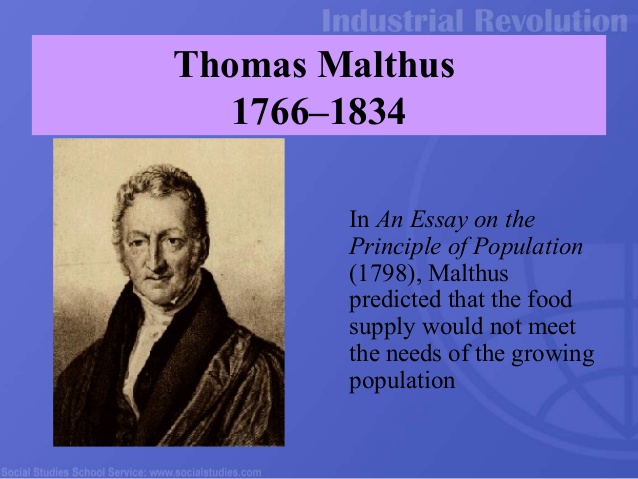The two most important economists in history, in terms of the impact they have had on the world, are Thomas Malthus and Adam Smith. Both wrote about the same fact, but from very different perspectives, and which one of these economists someone is influenced by (whether directly or indirectly) will have a tremendous impact on their political views.
Both men noted that for all of human existence, human populations always grew faster than food supplies, leaving the ruling 1% living in opulence, another 9% in relative abundance, and 90% in a perpetual state of slow starvation, never more than one bad harvest from death. England was the richest nation on Earth at the time, and both of these economists noted that the life of a typical English farm worker was virtually the same as that of a Roman slave.
Thomas Malthus wrote his seminal work (An Essay on the Principle of Population) on this fact, focusing on the moral shortcomings of a system in which 1% live in opulence while 90% are essentially starving.
Adam Smith took a different approach. Adam Smith noted that, while it was true that human populations had always historically grown faster than had food supplies, food supplies were suddenly growing more quickly than populations in England and England’s American colonies. Rather than writing an essay on inequity and starvation, Adam Smith wrote his seminal work (An Inquiry into the Nature and Causes of the Wealth of Nations) as a description of what had changed that allowed England and her American colonies to grow food supplies faster than populations.
To Adam Smith, what had happened in England and America was important. The implications of having food supplies growing faster than populations – this was the most significant thing that had happened in all human existence, making it critical that the cause be understood and replicated.
The cause was the Magna Carta.
Just as the 13th and 14th Amendments did not really end slavery right out of the gate so much as they ended slavery over time (Google ‘sharecropping’), so too the Magna Carta did not end serfdom immediately, but only over time.
Technically, a sharecropper was not a slave, as a sharecropper could leave whenever they wanted. Realistically, however, the sharecropper had few other choices.
Technically, an English farm worker was no longer a serf after the Magna Carta became law. Realistically, however, the former serf had few other choices.
By 1776, serfdom really had died in England and her American colonies. People were free to use their productive capacities however they wished. Some people opened businesses. Most people sold their labor to the highest bidder, and became employees.
Incidentally, there was no per capita GDP growth in the antebellum South. All of the per capita GDP growth, in all of human history, has occurred where slavery was illegal, and the United States has not been an exception. The South did not see any per capita GDP growth until after the Civil War, and though Adam Smith was long dead by then, he would not have been surprised by the fact that, just as freedom caused wealth to grow in England and the Northern United States, so too freedom caused wealth to start growing in the Southern States after the Civil War.
Adam Smith made a number of other observations, such as on the benefits of specialized labor, but all of Adam Smith’s observations stemmed from the fact that freedom was the reason food supplies were growing faster than populations.
We’ve come a long way since Adam Smith and Thomas Malthus, and many other economists have built upon their work. Fredrich Hayek and Milton Friedman expanded Adam Smith’s understanding of free markets into the modern world. Karl Marx took from Malthus, and suggested that the solution (to the degree that there was one) was simply to share better.
If you are more influenced by Adam Smith, you see wealth as something that people create by pairing ingenuity with productive capacities. In such a world, what one person earns does not detract from what someone else earns. One person becoming wealthy actually helps make other people more wealthy. Andrew Carnegie May have become ridiculously rich making steel, but his ability to constantly improve the quality of steel, while simultaneously making it less expensive, led to better and cheaper buildings, bridges, cars – everything that used steel as an input. What Andrew Carnegie earned was but a tiny fraction of the wealth he generated for society as a whole.

Similarly, Bill Gates, Steve Jobs, Jeff Bezos, and other modern ‘robber barons’ are not ‘robber barons’ at all, but are, rather, people who became fabulously wealthy making the rest of us wealthier as well.
The Adam Smith view of the world is one of gradually growing abundance, through the free exchange of ideas, and resources, between consenting individuals – aka, free markets.
Those who are influenced more by Thomas Malthus view the pot of wealth as somewhat static. Thomas Malthus knew that wealth could be created, but he believed that population growth outstripped the growth of wealth, and that there would never be enough for everyone. In this view of the world, if one person has more than they need, someone else pays for it through misery, and, ultimately, death. It is very hard to justify the existence of billionaires, when looking at the world through such a lens.
It is also worth noting that Adam Smith’s work was rational, logical, and descriptive. Adam Smith was not making a moral argument. He was explaining why and how human suffering was suddenly something that could be (and over time would be) reduced. Thomas Malthus, on the other hand, was making a moral argument against the accumulation of wealth. It is not at all surprising that those who are more influenced by Adam Smith tend to use logic and reason to explain their arguments, while those who are more influenced by Thomas Malthus tend to make purely moral arguments.
Adam Smith was a school teacher, whereas Thomas Malthus was a minister. Today, the followers of the minister call the followers of the teacher, ‘science deniers,’ while shouting down logic and reason with moral platitudes. Most people have no idea that their world view comes from one, or both, of these men.
In the short term, the pool of wealth is somewhat static, and it can be shared more effectively to reduce suffering and inequality. Over the medium to long terms, however, the kinds of policies that ‘share better’ discourage production, creating a poorer, more miserable world. As Margaret Thatcher put it, socialists “eventually run out of other people’s money.”
Ronald Reagan explained how it is that redistributionist philosophies can exist in spite of all of the evidence that free markets work, saying, “If you are explaining, you are losing.” Thomas Malthus’ arguments are purely moralistic in nature, so they require no explanation. Thomas Malthus can be boiled down to a simple statement – if one person has more than the bare minimum they need to survive, someone else will not survive. Freedom, in this view, is the cause of wealth, wealth is the cause of poverty, and poverty is the cause of misery.
Malthus was, of course, wrong, but try convincing a socialist of that. To convince the socialist, one must explain, and if you are explaining, you are losing…
























